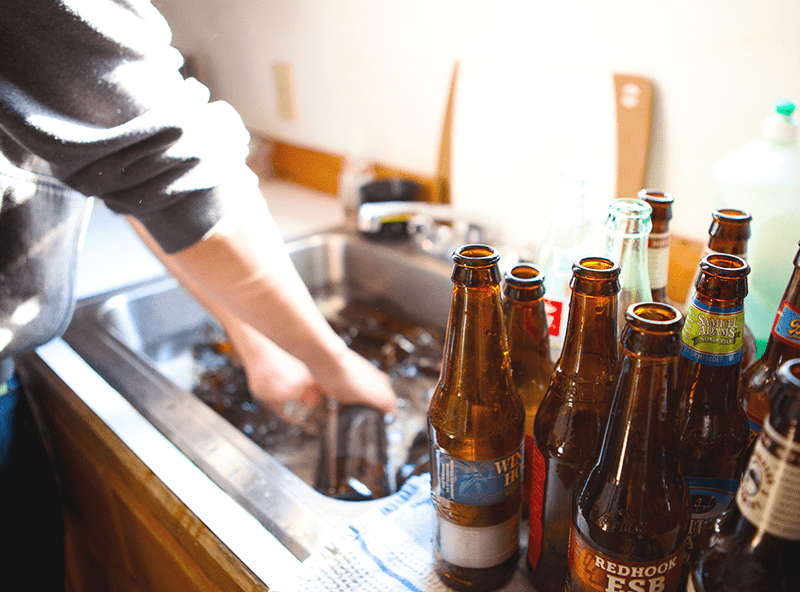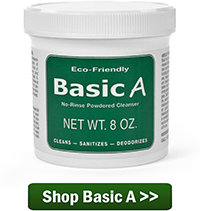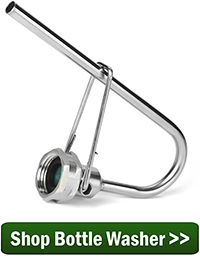 Many homebrewers will tell you that the first step to making good homebrew is to practice good cleaning and sanitizing habits. Without practicing good cleanliness, you run the risk of contamination by wild yeast and bacteria that could potentially ruin your batch of beer. While there are no known pathogens that can survive in beer, you certainly don’t want to throw a batch of homebrew down the drain because of spoilage!
Many homebrewers will tell you that the first step to making good homebrew is to practice good cleaning and sanitizing habits. Without practicing good cleanliness, you run the risk of contamination by wild yeast and bacteria that could potentially ruin your batch of beer. While there are no known pathogens that can survive in beer, you certainly don’t want to throw a batch of homebrew down the drain because of spoilage!
But don’t worry! Cleaning and sanitation are easy to master. Before too long, it will become second nature, so invest some time and energy early in your homebrewing career to develop good habits.
Here are some homebrew cleaning and sanitizing tips to help you make sure your beer is clean, enjoyable, and free of contamination:
- Don’t rush through these important first steps! As tempting as it is to save time on brew or bottle day, cleaning and sanitation can make the difference between a great batch and one that gets thrown out. Also remember, it’s called cleaning and sanitation for a reason – it’s a two-step process. It’s important to clean away visible debris using a brewery specific cleaner, such as One Step Cleanser or Basic A. Follow package instructions to ensure effective sanitation.
- Making the most of ordinary household cleaning products may save you some money, but it’s important to know which products are transferable to the brewing world and which are not. Sanitizing homebrew equipment with unscented household bleach as an alternative sanitizer is a very effective, but it doesn’t take much – Charlie Papazian recommends using 1-2 ounces of regular, non-concentrated bleach per gallon of cold water, and soaking for about 30 minutes and allowing to dry. The biggest problem with using bleach to sanitize you equipment and bottles is that it does not rinse well. It likes to cling to surfaces. If you do use bleach, rinse thoroughly 3 times with hot water. NOTE: Do not mix bleach with other cleaners.

- Do not use ordinary dish soap or detergent on your brewing equipment, as these can leave residues that will ruin your beer’s head retention. A good alternative is to us Five Star: Powdered Brewery Wash.
- Save a buck – and water – by reusing cleaning and sanitizing water when possible.
- Save more cash by filling a spray bottle with diluted sanitizer to spray down buckets and equipment. This uses less water than a soak, just make sure homebrew equipment gets enough contact time to ensure effective sanitation.
- Use non-abrasive scrubbers and brushes on plastic buckets and equipment. Scratches in the plastic are ideal hiding places for bacteria and wild yeast.
Tips for Homebrew Cleaning and Sanitizing on Bottling Day
- Be sure to remove the spigot from your bottling bucket before and after use and clean it well on the inside. By doing so you’re reducing the likelihood that significant “crud” will build up.
- If reusing beer bottles from the store or other homebrews, cleaning is much easier if you rinse well after drinking. This may seem like an obvious tip, but it can easily save a lot of time on bottling day!
- A
 typical dishwashing machine set to the sanitize cycle can be used for sanitizing beer bottles. Make sure they are thoroughly rinsed BEFORE loading them up. A bottle washer can be attached to a standard kitchen faucet to make this process easier.
typical dishwashing machine set to the sanitize cycle can be used for sanitizing beer bottles. Make sure they are thoroughly rinsed BEFORE loading them up. A bottle washer can be attached to a standard kitchen faucet to make this process easier.
- Don’t forget to sanitize your bottle caps! Use the same method as you would for sanitizing other equipment.
As you brew more batches over time, you’re likely to develop your own homebrew cleaning and sanitizing tips and trick. What advice do you have for maintaining sanitation in the home brewery?
—–
David Ackley is a beer writer, brewer, and self-described “craft beer crusader.” He holds a General Certificate in Brewing from the Institute of Brewing and Distilling.

I learned just a few days ago on this website to even rinse the no-rinse sanitizer from my bottles. I will do that next brew day.
Looking for a sanitizer that I can use on my Homebrew equipment that’s not too harsh and leave residue
Here you go: https://eckraus.com/one-step-no-rinse-cleanser-8-oz/